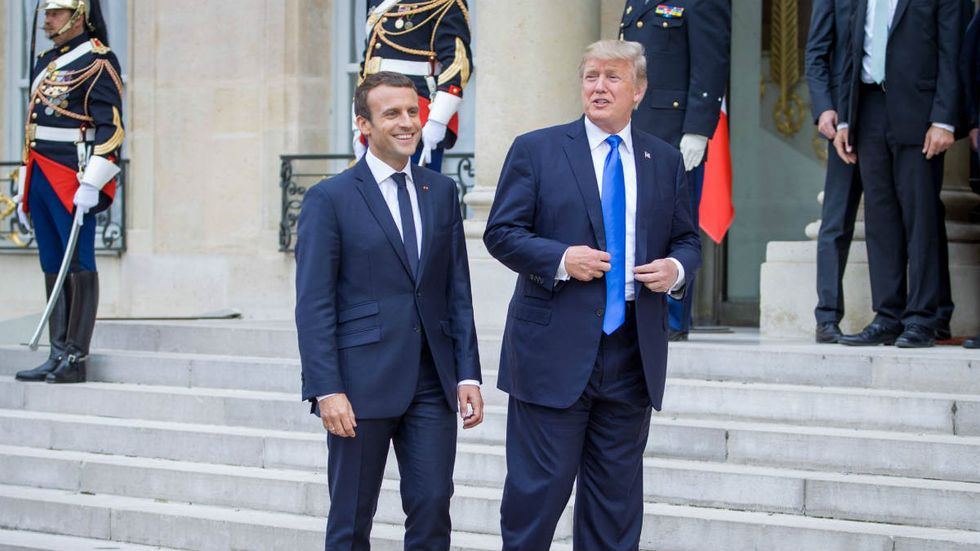
© 2024 Blaze Media LLC. All rights reserved.
Trump v. Macron defines the clash of nationalism against European progressivism
November 13, 2018
The fundamental philosophical differences between the leaders of the United States and France have spilled out into a full-blown public rhetorical spat. On Tuesday, President Trump fired back at French President Emmanuel Macron following the latter’s rhetorical shots directed at the America-first policies of the Trump White House.
In a tweetstorm this morning, the president unleashed a series of messages directed at Macron’s government:
Surely, the legacy media will denounce President Trump for his attack on the legitimacy of the elected President of France and his promotion of Macron’s nationalist rivals in Paris. However, it’s important to note that POTUS is merely counterpunching here, following the French president’s passive-aggressive attack this weekend.
Over the weekend, Macron delivered a speech at the Armistice Day anniversary (a ceremony recognizing the soldiers of World War I) in which he denounced the concept of nationalism. The denunciation was widely interpreted as a not-so-veiled shot at President Trump’s political philosophy.
“Nationalism is a betrayal of patriotism,” Macron proclaimed, adding, “By saying, ‘Our interests first, who cares about the others,’ we erase what a nation holds dearest, what gives it life, what gives it grace and what is essential: its moral values.”
The two world leaders have had a complicated relationship since President Trump took office. They have for quite some time maintained somewhat cordial personal relations, even though they remain at odds over major policy issues, such as the Iran nuclear deal, the Paris climate accords, tax and tariff policies, and their personal political philosophies. It appears their political differences have finally morphed into a fiercely personal clash.
Macron’s “globalist” political philosophy, which denounces nationalism as a force for evil, accurately represents the progressive movement in Western Europe, which seeks to continually centralize power in the bureaucratic behemoth that is the European Union. Macron has anti-nationalist allies in several progressive Western European nations. Today, one of Macron’s staunchest ideological allies, Germany’s Angela Merkel, called for an EU-backed joint army, which would wholly undermine the NATO alliance and the transatlantic alliance with the United States.
Macron’s campaign against nationalism comes in the heat of a legacy media and progressive political smear campaign against the tenets of nationalism. Many are weaponizing the term and smearing nationalism as a “white supremacist” philosophy akin to the Nazi regime’s ideology.
Simply put, nationalism is the preference for one’s country over another, while patriotism can be defined as having immense pride in one’s country. For conservatives, both nationalism and patriotism are healthy forces when focused in a state that advances and protects the individual rights of its citizens. Those two forces provide for a more stable world, in which sovereign states can treat each other with mutual respect and dignity.
#mc_embed_signup{background:#fff; clear:left; font:14px; }
/* Add your own MailChimp form style overrides in your site stylesheet or in this style block.
We recommend moving this block and the preceding CSS link to the HEAD of your HTML file. */
Want to leave a tip?
We answer to you. Help keep our content free of advertisers and big tech censorship by leaving a tip today.
Want to join the conversation?
Already a subscriber?
more stories
Sign up for the Blaze newsletter
By signing up, you agree to our Privacy Policy and Terms of Use, and agree to receive content that may sometimes include advertisements. You may opt out at any time.
© 2024 Blaze Media LLC. All rights reserved.
Get the stories that matter most delivered directly to your inbox.
By signing up, you agree to our Privacy Policy and Terms of Use, and agree to receive content that may sometimes include advertisements. You may opt out at any time.


